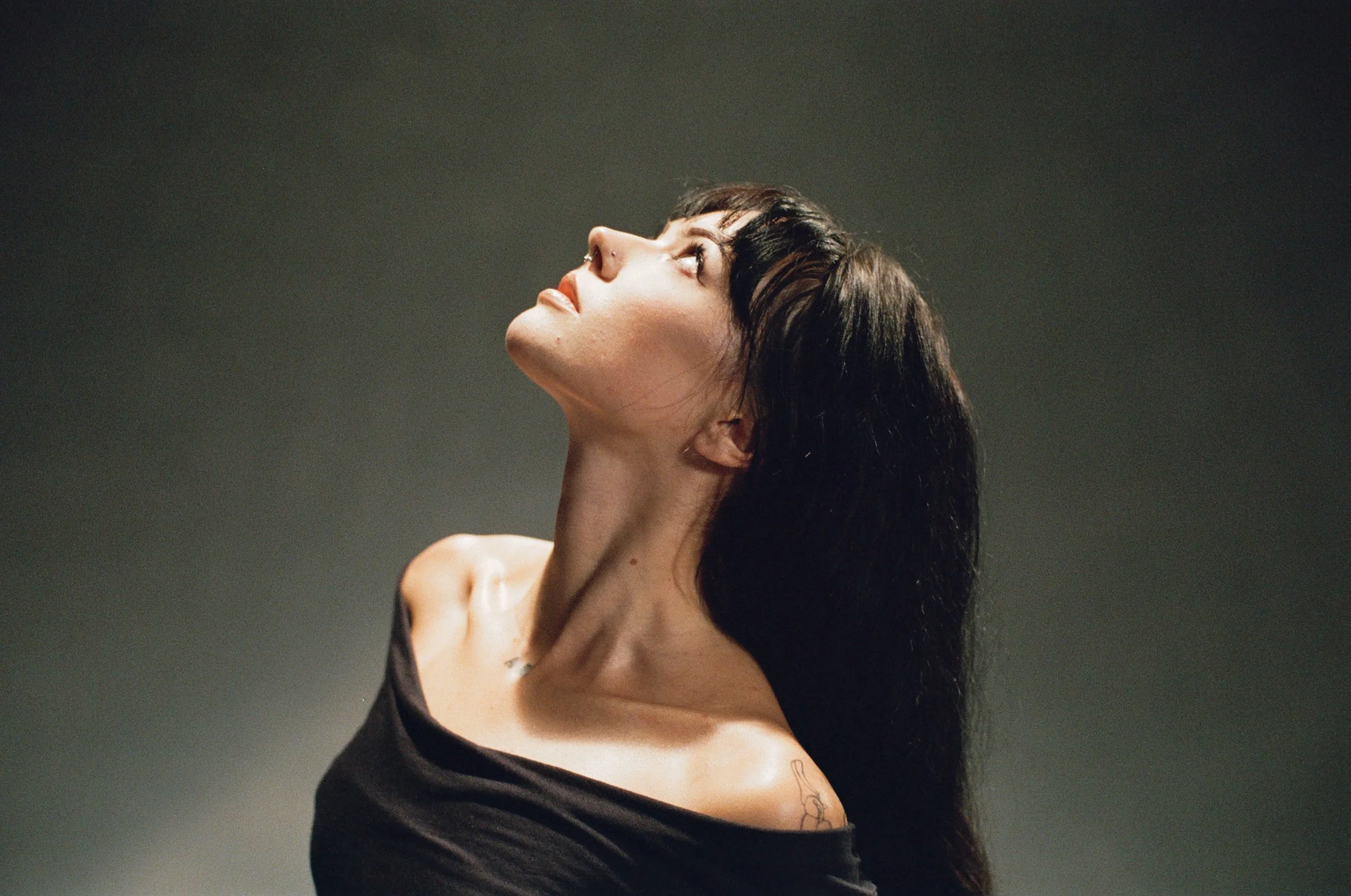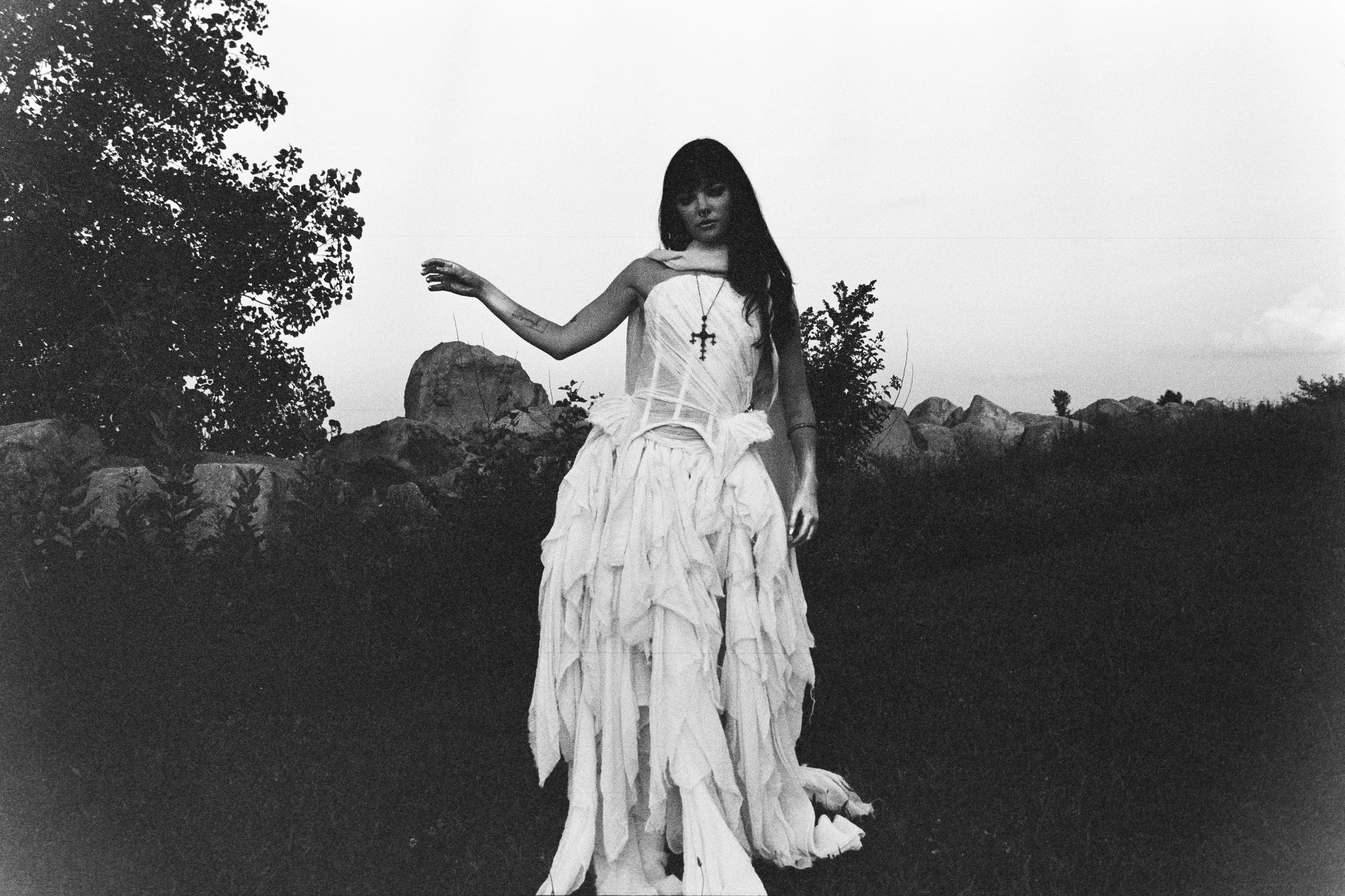Q&A: Delaney Bailey on Building a World of Emotion with her Debut Album ‘Concave’
INTERVIEW
INTERVIEW
☆ BY SHEVON GREENE ☆
Photo by Alexa Viscus
DELANEY BAILEY HAS ALWAYS BEEN A NATURAL-BORN STORYTELLER AND SONGWRITER — who makes a varied set of emotions feel massive and cinematic, especially with her upcoming music. Since breaking through with the viral “j’s lullaby (darlin’ i’d wait for you),” the Indiana-born, Chicago-based artist’s world of music lives somewhere between ethereal folk, indie pop and vulnerable confessionals. Her debut album, Concave (out January 21 via AWAL), expands that world into something even bigger. It roots itself in Romanticism’s love of nature and grand emotion while still carrying the intimacy that’s defined her work so far.
Across its 11 tracks, Bailey hones in on grief, relationships, self-discovery, and even questions of motherhood, all while experimenting with synths, layered vocals and cinematic textures inspired by Imogen Heap and darker 80s films. Tracks like her singles “Lion” and “Wake Up” push her sound into bold new places, balancing vulnerability with defiance and tenderness with raw intensity.
We chatted with Bailey about building Concave, writing songs that reveal their meaning over time and how she’s preparing to bring this new world to life on tour. Read below for more.
Photo by Alexa Viscus
LUNA: Concave draws on Romanticism and art, where landscapes are larger than life and emotions take center stage. How did that movement influence how you wrote and structured the album?
BAILEY: Sonically, I wanted the album to be full of big, interesting moments, mirroring Romanticism’s focus on nature. Conceptually, it’s about being dramatic and looking inward. This is the first body of work I’ve written fully about myself and how I navigate life. It’s dramatic, emotional, self-pitying, and I hope it shifts my genre a little—without being too drastic.
LUNA: You’ve said you wanted the record to feel like a world for listeners. What were the building blocks that helped you create that space?
BAILEY: A lot of the songs reference each other, so the album becomes a world within itself. A lot also comes from my background in visual art. I studied design at [Indiana University Bloomington], so I created a whole PowerPoint with inspiration—colors, movies, playlists—that guided the project. It was very medieval, emotional, full of blues and greens.
LUNA: The tracks explore grief, relationships, even motherhood. Was there a turning point in how you approached those themes?
BAILEY: Not really. I write constantly, so much of the album came from my archive of demos. “Lion” was one of the earliest and the first track I produced on GarageBand. Writing it gave me confidence—it was different from my past work, but it proved I could experiment while keeping my style. From there, I started making more layered demos and sending them to producers, rather than just guitar tracks.
LUNA: You’ve cited Imogen Heap and darker 80s films like Labyrinth and The Dark Crystal as inspiration. Where do you hear those references most?
BAILEY: Imogen Heap is everywhere. I love vocal stacking, probably from my years in concert choir. The film influence comes out visually, especially in the “Lion” video, but also in moodier tracks like “Wound,” “Wither,” and “Baby Dream.”
LUNA: What do you hope listeners feel after hearing Concave front to back?
BAILEY: The album starts with “How To,” where I repeat reminders like “use your hands, take your vitamins.” I’ve had a big fear of forgetting—my Wella passed from dementia—and that fear paralyzes me at times. The record takes you through that hole of sitting with yourself too long, then slowly toward songs like “Nightshade,” “Baby Dream,” “Concave,” and “Wake Up,” which are about living the life you know you’re capable of. I want people to walk away knowing they can get themselves out of a bad place.
LUNA: “Lion” feels like one of your boldest tracks, lyrically and visually. What did making it unlock for you?
BAILEY: Writing it was a mental exercise. At the time, I was in a relationship I didn’t want to be in but didn’t realize yet. People kept telling me I’d change my mind about having kids or moving away from family, but I knew myself better than that. Writing “Lion” made me feel confident and defiant, even though later I realized I didn’t know as much as I thought. It showed me how songs can hold lessons I only fully understand in hindsight.
LUNA: “Wake Up” has this tension between soft vulnerability and electronic texture. How did you land on that production?
BAILEY: I wrote it right after “Lion” and wanted to keep exploring that sonic world. I was listening to a lot of Imogen Heap and even EDM, so the electronic bed came naturally. Lyrically, it’s about realizing no one can change the voice in your head but you. It’s sadder than it sounds, and performing it live will probably feel really raw.
Photo by Alexa Viscus
LUNA: Growing up in a big family taught you to read other people’s emotions. Does that sensitivity help or complicate your writing?
BAILEY: Both. It helps because I write best about relationships—with myself and with others. But it can make writing harder when I’m happy. I’ve built my career on introspection and turmoil, so I don’t always know what happy music sounds like for me. That’s something I’ll figure out after this album (laughs).
LUNA: Your career started with acoustic ballads, but now you’re experimenting with synths and vocal effects. What’s been exciting about that?
BAILEY: I wrote this album to be played live. Early tours felt too bare, just me and one other person. But with a full band, like when I opened for Beach Bunny, the songs felt alive. So I wrote Concave with drums, synths, layers because I wanted it to thrive on stage.
LUNA: With Concave out in January, what does this album say about where you are as an artist and a person?
BAILEY: As an artist, it shows I’m willing to experiment and take risks. “Lion” was a huge leap, but I wanted to grow and challenge myself. As a person, it shows I’m growing up. Therapy has helped me recognize my issues, and writing about them is a way of letting them go and letting others love them too.
LUNA: You’re heading out on your first Midwest headlining tour soon. How are you planning to translate Concave into a live show?
BAILEY: By being on stage with friends I trust. This will be my first time performing so many songs that are deeply personal, and it’s going to be emotional. Some nights I might cry, but that’s part of it (laughs). I’m excited to see how these songs grow live.
Photo by Alexa Viscus




